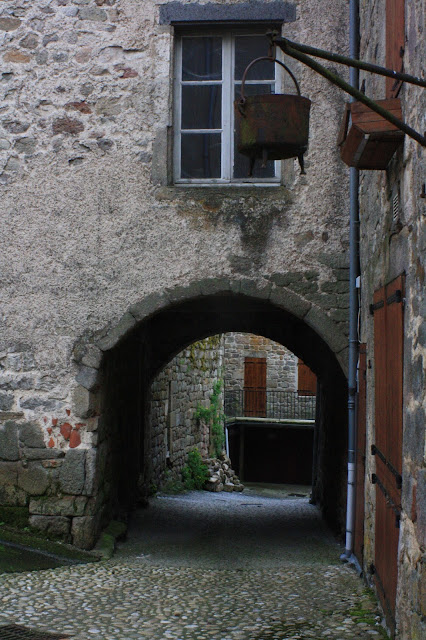The plan for today was to travel from St Pourçain to Pradelles, a journey of about 135 miles. Looking at the map there were two obvious routes, one directly south on the D106 towards Le Puy En Velay, the other a bit of a dog leg, picking up the free A75 motorway at Clermont Ferrand, then cutting across country skirting the forested hills of the Livradois in the Haut Loire. It was the latter route we opted for, concluding that we would make quicker progress on the motorway and it would be less stressful. It was true we made good progress, but the route was not entirely stress free as it involved negotiating the suburbs of Clermont-Ferrand, a mix of retail sprawl and crumbling steam-punk Michelin factories.
Clear of the city the A75 winds through the gorge of the l' Allier then climbs steadily up to 1000 metres crossing the high plateau of the Central Massif. It's a well trodden road south for us, so it was great to deviate from it; at junction 20 we headed west through 'unknown territory' on the N88. It connects the Auvergne to the Cevennes. Even though it was a cloudy day the big vistas across the high plains were a spectacular sight.
It seems everywhere in France is home to some delicacy or other. The area around Puy is famous for a particular variety of green lentil, though in fact the pulse is a sludgy grey colour. Big DOP signs outside roadside farms promised 'vente direct. It's a surefire sign of a country serious about its food culture when even a humble pulse can boast a unique appellation.
Tonight's motorhome aire evidences France's food culture too. It is located in a large charcouterie just outside the village of Pradelles. As well as all kinds of meats, patés, hams and cheeses, the shop stocks local wines and beers, a delicatessen counter with all kind and goodies as well as puy lentils stocked in all sizes from 250g packets to 5kg sacks. The place provides free overnight parking to passing motorhomes knowing that most people will spend a few euro in the shop, which exactly what we did - a classic symbiotic arrangement, everybody wins.
After depositing our purchases in the van we headed off to explore the village, about a kilometre distant down a narrow lane that once was the main road to Pradelles. Though little more than a village now, the centre has some impressive five storey houses and a series of small squares, each with a fountain.
 |
| Basic free aire in the grounds of a large charcouterie |
 |
| with a view across the upper Allier valley |
 |
| The place sells all more than just meat products - local cheeses, wine, Puy lentils, craft beers and Bio fruit juices... |
After depositing our purchases in the van we headed off to explore the village, about a kilometre distant down a narrow lane that once was the main road to Pradelles. Though little more than a village now, the centre has some impressive five storey houses and a series of small squares, each with a fountain.
 |
| The forecast rain arrives... |
On cue, as we crossed the central square,, a bedraggled looking man in a black waterproof poncho and soggy straw hat wandered by, trudging slowly behind - a depressed looking donkey. Christopher and Eeyore were followed moments later three female companions. They looked none too delighted either.
I wonder why people undertake such reenactments? It cannot be to recapture the world that Stevenson observed. The self sufficient, introverted peasant culture was changing as the writer recorded it. I seem to recall he mused about the arrival of the railways hereabouts; he was fated to suffer the anthropologists' dilemma, there can be no such thing as an objective cultural observer, by recording events you change them.
So why do people follow in his footsteps? I think Stevenson explains that himself -
"For my part, I travel not to go anywhere, but to go. I travel for travel's sake. The great affair is to move; to feel the needs and hitches of our life more clearly; to come down off this feather-bed of civilization, and find the globe granite underfoot and strewn with cutting flints. Alas, as we get up in life, and are more preoccupied with our affairs, even a holiday is a thing that must be worked for. To hold a pack upon a pack-saddle against a gale out of the freezing north is no high industry, but it is one that serves to occupy and compose the mind. And when the present is so exacting who can annoy himself about the future?"
I can go along with that as an explanation of the travellers' mindset. We may lack a donkey, but can still share the sentiment.









No comments:
Post a Comment